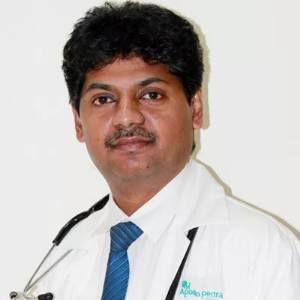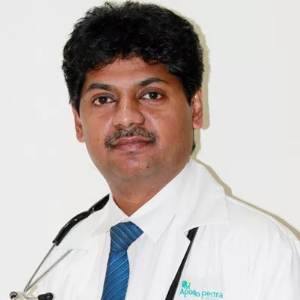Venous Insufficiency Treatment in MRC Nagar, Chennai
What are Venous Diseases?
Your heart pumps blood to the different organs through the circulatory system. The function of the arteries is to carry oxygen-rich blood from the heart to the various organs, and the role of the veins is to bring the oxygen-poor blood back to the heart. Venous diseases damage the valves inside the veins. Therefore, you should consult a venous diseases specialist near you whenever you notice symptoms of venous diseases.
Veins are flexible tubes that are hollow and have flaps inside called valves. Veins located in the skin are called superficial veins, and those found in the muscles of arms and legs are called deep veins. Damaged vein walls lead to various venous diseases such as varicose veins, superficial thrombophlebitis of deep vein thrombosis. Venous diseases are quite common and can be life-threatening too. Venous diseases doctors in MRC Nagar will treat you according to the venous disease you suffer from.

What are the Symptoms of Venous Diseases?
Your symptoms of venous diseases depend upon the type of venous disease you are suffering from -
- Burning in your legs
- Itching in the legs
- Throbbing or aching in your legs
- Swelling of the legs and ankles is known as edema
- Leg cramps
- Fatigue and weak legs
- The skin around the ankles changes color
- Leg ulcers
- Pain increases when you stand and reduces when you raise your legs
What are the Causes of Venous Diseases?
There are several causes of venous diseases, which have been discussed below:
- Venous diseases might be caused by immobility which leads to an interruption in blood flow. Heart patients or orthopedic surgery patients who are bedridden for a long time may suffer from venous diseases. Even healthy people who sit or lie for lengthy periods may suffer from venous diseases.
- Infectious organisms, trauma, intravenous needles and catheters, chemotherapy might injure blood vessels. It will lead to several venous diseases.
- Systemic lupus erythematosus is a condition that increases blood clotting.
- If you are pregnant with varicose veins, you are at a high risk of getting superficial thrombophlebitis.
- Certain cancers might lead to deep vein thrombophlebitis.
When to See a Doctor?
You need to visit a venous diseases hospital near you if you notice any symptoms of venous diseases such as swelling of ankles or legs, tightness in the calves, or persistent pain. Certain venous diseases can be life-threatening; therefore, prompt treatment is necessary.
Request an appointment at Apollo Spectra Hospitals, MRC Nagar, Chennai
Call 1860 500 2244 to book an appointment
How are Venous Diseases Treated?
If you suffer from venous diseases, doctors near you might prescribe a healthy lifestyle, compression therapy, compression stockings, or medicine like blood thinners to prevent blood clots. Your doctor might also recommend the following non-surgical procedures:
- Vena cava filter: A device is inserted in your veins to stop blood clots before they affect your lungs.
- Angioplasty and stenting: Venous angioplasty is done to treat the blocked veins to allow blood flow. A metal mesh tube called a stent may be placed inside a vein to prevent further blockage.
- Sclerotherapy: A concentrated salt solution is injected into your damaged veins to make them disappear.
- Endovenous thermal ablation: This procedure used laser beams to close off damaged veins.
If your venous diseases become severe, then your venous diseases specialist in MRC Nagar might suggest -
- Ligation and stripping: This procedure is conducted by first tying off the damaged veins and then stripping them. It is done through a minimally invasive surgery called venous ablation.
- Bypass surgery: This procedure is conducted to reroute the flow of blood around damaged or blocked veins.
- Subfascial endoscopic perforator surgery or SEPS: This procedure is conducted by surgically removing ulcers from perforator veins.
- Valve repair surgery: A long hollow catheter is used to make a small cut on the leg to repair the damaged veins.
Conclusion
You can develop venous diseases if you have a history of venous diseases in the family. Regular exercise and a healthy lifestyle can help you prevent them from developing. You should also maintain a healthy body weight to avoid venous diseases.
Venous diseases could lead to swelling in your legs, a tight feeling in your calves, and pain while walking, reducing when the legs are raised.
Yes, venous diseases like superficial thrombophlebitis can be life-threatening.
The best treatment for venous diseases is compressed stockings. They improve blood flow and also reduce swelling and pain.
Symptoms
Our Doctors
DR RAJAH V KOPPALA
MBBS, MD, FRCR (UK)...
| Experience | : | 23 Yeras Experience |
|---|---|---|
| Speciality | : | Vascular Surgery... | Location | : | Alwarpet |
| Timings | : | Mon - Sat | 11:00a... |
DR. BALAKUMAR S
MBBS,MS, MCh...
| Experience | : | 21 Yeras Experience |
|---|---|---|
| Speciality | : | Vascular Surgery... | Location | : | MRC Nagar |
| Timings | : | Mon - Sat : 4:30 PM ... |
DR. BALAKUMAR S
MBBS,MS, MCh...
| Experience | : | 21 Yeras Experience |
|---|---|---|
| Speciality | : | Vascular Surgery... | Location | : | Alwarpet |
| Timings | : | Available by prior a... |
Our Top Specialities
NOTICE BOARD
CONTACT US
CONTACT US
 Book Appointment
Book Appointment





.svg)
.svg)
.svg)
.svg)








